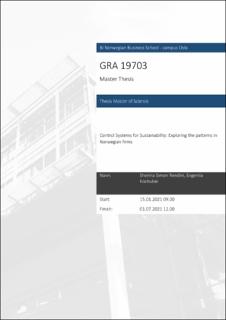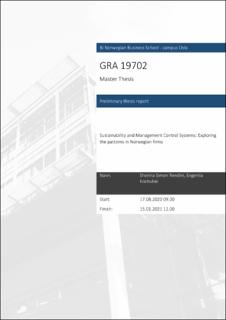| dc.description.abstract | Sustainability is becoming of high importance for companies. Businesses
increasingly commit to sustainability initiatives and report on sustainability
performances. They also start to develop and embed sustainability strategies into
their operation activities, reshaping their business models, value and supply chains
based on new principles like circular economy. Confidence in sustainability
reporting and implementation of sustainability strategies are defined as a research
area for the current study. Although the identified issues can be analysed from
different angles, the current study utilises the concepts of internal and
management controls, the practices of which are closely related.
Based on Malmi and Brown’s management control framework (2008) and COSO
Internal Control-Integrated Framework (2013), this thesis, first, examines what
control mechanisms Norwegian companies are using to achieve sustainability
goals, and then explores the extent to which packages of formal and informal
control mechanisms are developed in the observed companies, further theorizing
the sustainability control patterns. The study uses a mixed research design with
the data collection methods of the online survey and semi-structured interviews.
The results of the study show that all control mechanisms were deployed in the
researched companies, with cultural control and planning control being the most
widely used types of control, and rewards and compensation being the rarest
applied control system. The study identifies five distinct control systems packages
and concludes that both formal and informal controls are likely to be necessary in
order to achieve sustainability goals. In addition, the study theorizes the path
towards developing a complete control package, discussing obstacles to moving
from one package to another and, where possible, how to overcome them. The
insights and recommendations provided in this paper are likely to support
organizations in their effort to translate aspirations into practices. Finally, the
study proposes opportunities for future research.
Keywords: management control systems, internal control, package, sustainability
strategy, sustainable development | en_US |

